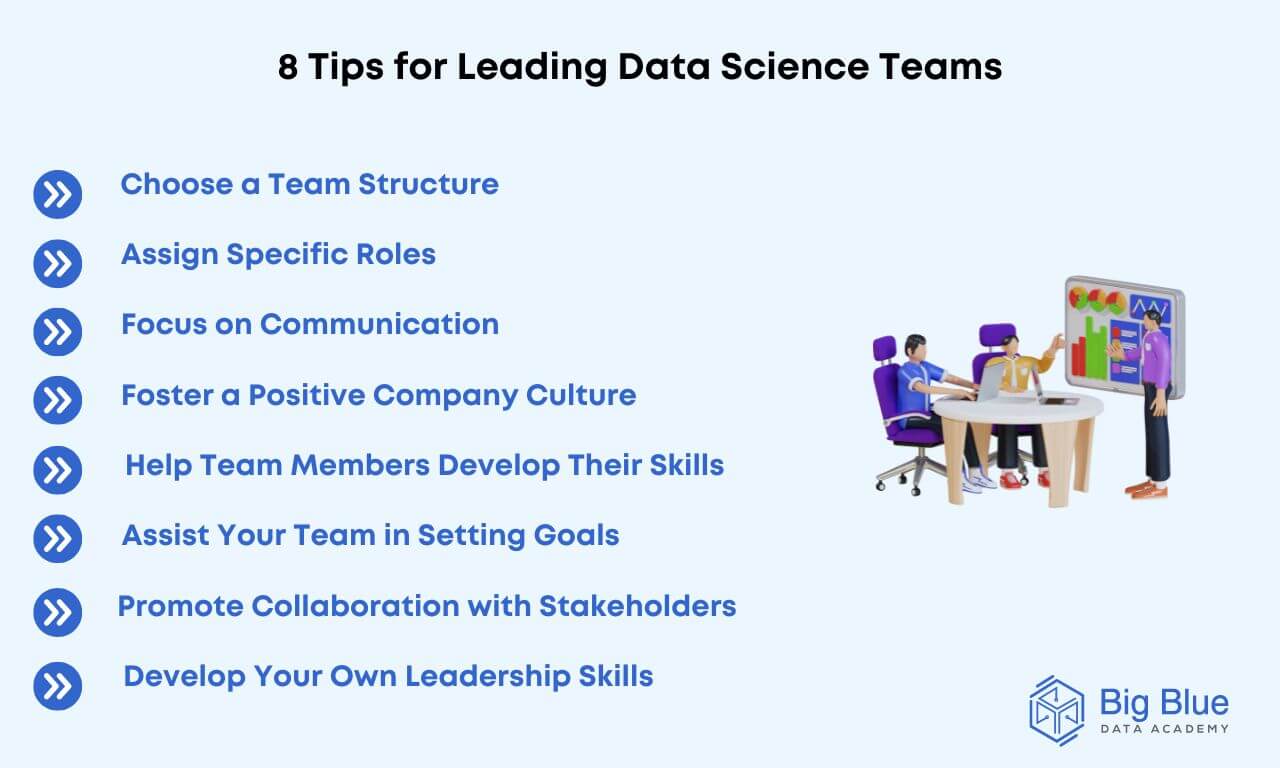8 Tips for Leading Data Science Teams
Data science teams in a company consist of many diverse professionals with distinct roles.
In order for these individuals to work efficiently and with increased productivity, it is necessary for the team to be cohesive, able to meet emerging demands, and have unified project delivery.
Thus, understanding how to lead a data science team is of utmost importance.
In today's article, we have gathered the following 8 effective tips for leading data science teams:
Choose a team structure
Assign specific roles
Focus on communication
Foster a positive company culture
Help team members develop their skills
Assist your team in setting goals
Promote collaboration with stakeholders
Develop your own leadership skills
Let's get started!

Tip #1: Choose a Team Structure
The way companies structure their teams can vary depending on their goals, team size, and overall company culture.
However, certain models have emerged regarding the data science team structure.
Let's examine them in more detail:
Decentralized
A decentralized team structure essentially creates smaller teams for specific functions and allocates resources to these individual functions.
This structure is better suited and operates more efficiently for companies that require simple data analysis since resource allocation only occurs where the company needs it.
Centralized
A centralized team structure is a unified group of data science professionals that cover all the data science needs of the respective company.
This model allows for easier strategic and uniform implementation of best analytical practices.
Hybrid
A hybrid team structure combines both centralized and decentralized team structures, as we saw earlier.
In this particular structure, the data science manager views the data team as a unified entity, but each professional performs tasks within specific business functions.
Tip #2: Assign Specific Roles
The assignment of specific roles to members of a data science team is crucial for smooth operation and time efficiency.
In addition to data scientists, who are the core members, there are other roles that may not possess the full skill set of a data scientist but can provide supportive assistance.
Among these are data analysts, data engineers, and data architects.
Tip #3: Focus on Communication
In an environment where many different individuals work, often in a hybrid or remote model, communication is of high importance.
For leading data science teams, a manager needs to emphasize both their own communication with team members and the communication between team members.
They need to systematically and patiently resolve any potential disagreements that arise and establish the foundations for minimizing them.
To achieve this, it is necessary to maintain regular communication with the team and set priorities.
Tip #4: Foster a Positive Company Culture
Promoting a data-driven culture and a positive work environment can assist in creating a supportive workforce.
Therefore, a data science manager needs to address the needs and concerns of the team, demonstrating support and willingness to address questions regarding data usage from a strategic and business perspective.
Tip #5: Assist Team Members in Skill Development
Skill development can promote innovation and help the data science team operate more efficiently.
As a data science manager, you can assist your team in developing both hard and soft skills.
Essentially, this involves focusing on enhancing strengths and addressing potential weaknesses.
Place emphasis on upskilling your team, both in technical areas such as AI and machine learning, as well as soft skills, including teamwork.
Tip #6: Help Your Team Set Goals
Often, due to the volume of data, data scientists may struggle with setting priorities.
Therefore, without clear goals from the start, they may not know exactly where to focus first, whether it's building the best possible machine learning model or data processing.
Thus, goal setting is of high importance.
Tip #7: Promote Collaboration with Stakeholders
Continuing, another valuable guidance tip for data science teams is as a manager, to promote collaboration with stakeholders.
To build a better relationship between the data team and stakeholders and strengthen trust, it is beneficial to establish regular communication between both parties.
Stakeholders within a company often expect updates on progress and the status of a project.
Similarly, members of the data science team may have questions regarding certain business matters.
Tip #8: Develop Your Own Leadership Skills
Another important piece of advice is, of course, to develop your own leadership skills.
As the team leader, an effective way to guide them is by continuously improving your abilities in leadership and organization through constant learning from various sources available.
In Summary
We have seen in detail 8 tips for leading data science teams to enhance performance and foster innovation.
Skills in the field of data science are particularly crucial for the growth of a business in today's competitive environment.
If you are enthusiastic about data and data science in general, follow us for more educational articles!


.jpg)